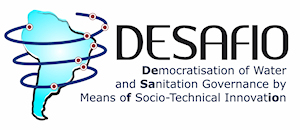3.2 Socio-Technical Dimensions of the ‘Integrated Sanitation’ System in Low-Income Neighbourhoods in Recife, Brazil
This case study focused on the ‘Integrated Sanitation’ (Saneamento Integrado) system that was introduced in the city of Recife, Brazil, in 2001. The model was adapted from previous experiences that had taken place in the State of Sao Paulo in the 1990s, and was designed to provide a solution to the lack of essential services in the most deprived neighbourhoods. The experience sought to move beyond tokenistic community participation and introduced mechanisms of radical democracy, such as developing channels to enhance the democratic social control of public services by the different actors involved, in particular poor communities. It also promoted inter-sector cooperation between different levels of government to guarantee effectiveness in the provision of essential services. The experience integrated interventions for the supply of water and sanitation, improvements in the wastewater treatment infrastructure, rubbish collection, urban planning, social housing provision, disease vector control, and environmental education, among other aspects. The case study examined the performance of the ‘integrated sanitation’ system in the community of Mustardinha, which formed part of a Pilot Plan, over the period 2001-2012. We placed emphasis on the interaction between the social and technical dimensions of the process, covering issues such as the level of appropriation of the system by the community, their role in the decision-making process related to public policies to be implemented in poor areas, in the monitoring of the infrastructure works, and later of the provision of the services, on the results of the implementation of the Pilot Plan, and on the conditions that may facilitate or hinder the sustainability and replicability of the system.
The principal researcher in this case was Hermelinda Maria Rocha Ferreira, from Pernambuco’s Water and Climate Agency (APAC), based for this research at the Federal University of Pernambuco (UFPE). Rocha Ferreira was the General Director of Inter-Sector and Social Articulation at the Secretariat of Sanitation, Municipality of Recife (2001-2012), and was in charge of the social aspects of the implementation of the Integrated Sanitation system in the city. This case study involved the participation of a range of local actors in the research work, including community leaders from Mustardinha, and the Federation of Entities for Social and Educational Assistance (FASE), Pernambuco, Brazil. Rocha Ferreira carried out her work with support from DESAFIO’s Co-ordinator.
The case study report has now been published as:
Castro, J. E., and H. M. R. Ferreira (2015). “Socio-technical dimensions of the Integrated Sanitation system in low income areas, Recife, Brazil”, in J. E. Castro (Ed.), WATERLAT-GOBACIT Working Papers, DESAFIO Project Series SPIDES, Vol. 2, No 10. Download it here.













